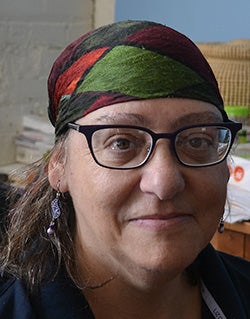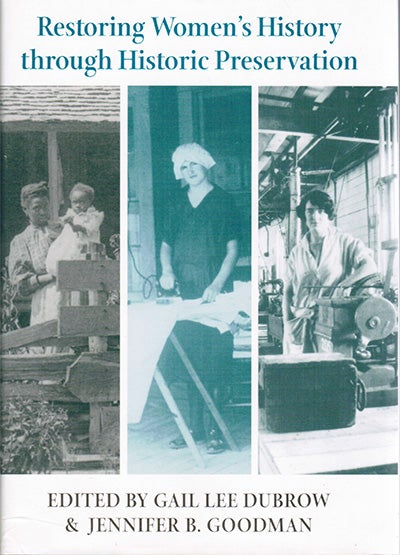 Gail Dubrow is the 2015 recipient of the Ellis F. Lawrence Medal, the highest alumni honor presented by the School of Architecture and Allied Arts. A social historian of the built environment and cultural landscapes, she has worked closely with the National Park Service and with state and local agencies on projects that have increased their capacity to protect historic resources that reflect the diversity of the American people. She earned her bachelor of architecture degree from the UO in 1980.
Gail Dubrow is the 2015 recipient of the Ellis F. Lawrence Medal, the highest alumni honor presented by the School of Architecture and Allied Arts. A social historian of the built environment and cultural landscapes, she has worked closely with the National Park Service and with state and local agencies on projects that have increased their capacity to protect historic resources that reflect the diversity of the American people. She earned her bachelor of architecture degree from the UO in 1980.
UO A&AA Acting Dean Brook Muller will present the Lawrence Medal award to Dubrow during commencement ceremonies June 15.
“As the A&AA community celebrates 100 years of transformative, critical, and creative education, it is with great honor that we celebrate the many extraordinary accomplishments of Gail Dubrow,” Muller said in announcing the award. “Gail is a leader in interdisciplinary education and research, aligning as she does disciplines such as architecture, landscape architecture, historic preservation, and planning. Gail has a phenomenal record of service as an academic leader and in professional organizations germane to several A&AA departments and programs. And in all her efforts one finds an unwavering commitment to issues of equity, inclusion, and diversity—a commitment that resonates deeply with the ethos of the school.”
Dubrow got the most out of her education, earning dual degrees in architecture (BArch, 1980) and English (BA, 1976, MA, 1979) during her time at University of Oregon. She received a doctorate in urban planning from the University of California Los Angeles in 1991.
Dubrow’s work in the preservation movement has raised public awareness of the history of American women, ethnic communities of color, LGBTQ communities, and other underrepresented groups by identifying, documenting, interpreting, and protecting places significant in their heritage. As a faculty member at the University of Washington from 1989 to 2005, she founded and directed the Preservation Planning and Design Program, preparing a new generation of architects, landscape architects, and planners to address a wide array of preservation issues in their work, with special attention to protecting vernacular resources.
She is the author of two award-winning books, Restoring Women’s History Through Historic Preservation, coedited with Jennifer Goodman (Baltimore, MD: Johns Hopkins University Press, 2003) and Sento at Sixth and Main: Preserving Landmarks of Japanese American Heritage, with Donna Graves, (Washington, DC: Smithsonian Institution Press, 2004). The former won the Antoinette Forrester Downing Award from the Society of Architectural Historians for the Best Book in Historic Preservation and the latter won the Environmental Design Research Association/Places award.
A number of the places that she and her students documented have been designated as historic landmarks, including the Cesar Chavez National Monument (California), Panama Hotel (Washington), and New England Hospital for Women and Children (Massachusetts). She has also designed public artworks that address previously neglected aspects of urban history for the Seattle Arts Commission.
Dubrow’s projects have received support from the American Institute of Architects/American Architectural Foundation, Graham Foundation, and National Trust for Historic Preservation; and her work has been honored with awards from the Society of Architectural Historians and Environmental Design Research Association, among others. She has served on the boards of many key organizations within architectural and planning education, including the Association of Collegiate Schools of Architecture, Journal of Architectural Education, Vernacular Architecture Forum, and Society for American City and Regional Planning History.
Dubrow’s career as an educator, scholar, and preservationist has been complemented by leadership roles in academic administration. Following four years of service as an associate dean in the College of Architecture and Urban Planning at University of Washington, the Offices of the President and Provost sponsored her as a 2003-04 Fellow of the American Council on Education, in preparation for a position in academic administration.
In 2005 she was recruited by the University of Minnesota to serve as vice provost and dean of the Graduate School, where she led major initiatives to increase the diversity of future faculty and professionals, support interdisciplinary activity, and advance innovation in doctoral education.
The founder and leader of a group of ten public and private universities committed to fostering interdisciplinary inquiry, Dubrow is a national expert on institutional policies and practices that support interdisciplinary education and research. Since stepping out of central leadership in 2009, she has returned to the University of Minnesota faculty as professor of architecture, landscape architecture, public affairs and planning, and history.
She is currently writing a book, Preserving Cultural Diversity in America, and beginning research on a new project, Japonisme Revisited, that explores the complicated relationship between virulent hostility toward Japanese immigrants and the embrace of all things Japanese at the turn of the century in America, with fellowship support from the American Council on Learned Societies.


Above left: Sento at Sixth and Main: Preserving Landmarks of Japanese American Heritage, written by Dubrow with Donna Graves, (Washington, DC: Smithsonian Institution Press, 2004). Above right: Restoring Women’s History Through Historic Preservation, coedited by Dubrow with Jennifer Goodman (Baltimore, MD: Johns Hopkins University Press, 2003), won the Antoinette Forrester Downing Award from the Society of Architectural Historians for the Best Book in Historic Preservation.

Above: Sento at Sixth won the Environmental Design Research Association/Places award. This image is from a series commissioned by the Seattle Art Commission. Its title is "Panama Hotel, Seattle, WA." Image courtesy Gail Dubrow and Frank Ching.
